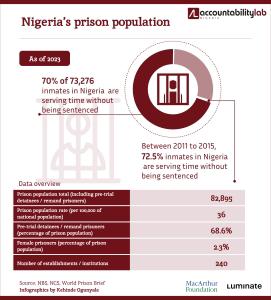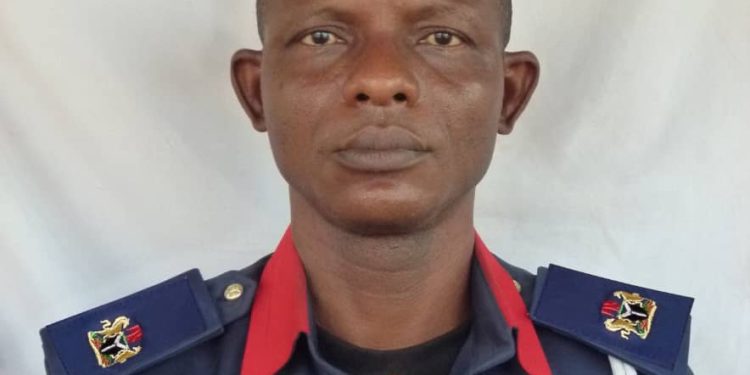Ebube Chukwu, a 50-year-old father of three had just travelled about 820 kilometres and 15 hours on the road down home from Gombe state in North East Nigeria to Ebonyi State in South East, Nigeria. He had been away from his family for months, working in Gombe and sending money home from time to time but had decided to go see his family that period.
On arrival, his kinsmen informed him that someone was found dead in the neighbourhood the day before his arrival and that the Nigeria Police Force were on rampage arresting people randomly. Not long after the discussion, the police arrived at Chukwu’s compound. His family members and onlookers were left surprised when the officers ordered Chukwu to enter their van.
All entreaties that he had just returned from a long journey fell on deaf ears, including pointing to his unpacked travelling bag as evidence. The police insisted that when he gets to the police station, he will have an opportunity to explain himself. As someone who had no skeleton in his cupboard, Chukwu complied. He was optimistic that after his explanations and in the worst case scenario preliminary investigations will suffice, but the police had other plans.
Despite his explanations and effort s by the relatives to bail him, Chukwu was charged to court. While the case went on, he was remanded in correctional custody.
Okeh to the rescue
Nelson Okeh serves as the Head of Forensic Investigation at the Nigerian Security and Civil Defence and has been reputed for his stance on justice and integrity. In 2018, while visiting the Nigerian correctional centre in Ebonyi State, the prison warders showed Okeh an inmate who in their assessment has been found worthy in character and conduct since his arrival at the correctional centre. The man was Ebube Chukwu. He has been remanded at the correctional centre for 10 years while the trial foot-dragged through several adjournments.
Serving prison terms without sentencing is a common practice in Nigeria. In 2020, the then Head of the Nigerian Correctional Service, Ja’afaru Ahmed said 51, 983 inmates out of 73, 726 (70%) prison’s total population in Nigeria are serving time without being sentenced. Data by Nigeria’s National Bureau of Statistics covering 2011 to 2015 had shown that the situation was worse with 72.5%.
As soon as Okeh was furnished with this information, he took it upon himself to personally investigate the case.
“After investigation, I found out that indeed he was in Gombe State when the crime was committed in Ebonyi. The investigation proved that he was not in Ebonyi when that murder case happened. So, I now used forensic evidence to prove that if someone was killed, this guy was not there at the point the crime happened,” he revealed.
The forensic evidence gathered by Okeh turned out to be the masterstroke in the case. Evidence as substantial as that was lacking throughout the 10 years period the case lagged. Thereafter, he took his report to the Ministry of Justice, followed up with the case until Chukwu got the justice he deserved. He was finally discharged and acquitted and has since reunited with his family in Gombe after 11 years in detention.
Okeh’s Bias for Justice saves Four
Back in October 2016, in a high-profile case of suspected vandalism, unlawful possession, and stealing of vandalized armoured cable belonging to Ebonyi state ministry of power and Energy, four individuals; Ifeanyi Ugwu, Okereke Nnaemeka, Ene Chimaobi, Onyebuchi Ibe were arrested by the Nigeria Security and Civil Defense Corps, a security agency charged with the responsibility of protecting public infrastructure.
Nelson Okeh’s integrity was put to the test when he was assigned the case as Head of Forensic Investigation.
He started his investigation and followed all due procedures. But during the course of his investigation, he discovered that although the suspects arrested by his command were caught transporting 16mm cables, what was actually vandalized was 35mm Cutix armoured cables.He also discovered that the suspects had license to trade on armored cables.
“This implied that there was only circumstantial evidence in the case and direct evidence was not found on these persons,” Okeh explains what his findings meant.
Pressure to Subvert Justice
As investigation in the case went on, the State government became more interested as the armoured cables vandalized were feeding electricity at the State Government Hatchery at Abakaliki. Okeh hinted that the Commissioner for Power and Energy had to give the Command millions of naira to facilitate the prosecution, this is because “the government was interested to see that these people go to jail.”
After documenting his findings which showed the suspects were not found with direct evidence, pressure came from his superiors in the office for him to stick the vandalization to the suspects apprehended. But the true test of integrity lies in consistently making virtuous choices and upholding principles regardless of external influences.
“My boss was on my neck and incidentally he nominated me to go for the course that made me Head of Forensic Investigation. On the other hand, I couldn’t force evidence on innocent people just because the office is interested. My conscience would never allow me. Because of this, I put my writing up the way it should be and I told the Commandant that the case should go to court so that the judge would look at the whole matter and give its judgment,” he stated.
In order to show transparency with the case, Okeh requested the case be reassigned to another person for re-investigation if the Command has reasons to doubt his report and also asked that he should as well be investigated if they had reasons to believe that he is compromised. Be that as it may, the requests for re-investigation were refused by the State Commandant.
The Assistant Commandant of the NSCDC Ebonyi State, John Agbe said he was not surprised at the stance of Okeh because of his known disposition for justice.
“Nelson Okeh is a man who would never compromise no matter the pressure, even monetary pressure. Okeh that I know, he stands by the truth no matter who is involved. Some people call him a controversial man. But the fact is that the truth is always bitter. I believe in him so much,” he said.
Okeh resists more pressure from servants of the temple of Justice
As the case commenced in court with testimonies from witnesses, the time came for Okeh to testify. On the date slated for his testimony, the prosecution lawyer surprisingly told the court that Okeh was transferred, which never happened.
He said this was schemed in a bid to drag the case until he was finally transferred as there were such moves due to his determination of non-compromise.
“When I confronted the prosecution lawyer on why she lied to the court, she claimed that she didn’t prepare her defense.This made the judge adjourn the case two weeks ahead. Again, two days to the case, I went to her and reminded her that we are going to court in two days. She said again that she hasn’t prepared her defense.
“At that point, I sensed that something is fishy and that she doesn’t want me to go and testify in court thereby causing stillbirth for justice. That made me approach the Commandant and told her that in the case that I was accused of taking bribes, I am ready to finish what I had started but strange things are happening from those who are seen as servants in the temple of Justice. I narrated what had happened in court and what followed.”
The Commandant had to summon the prosecution lawyer. The fact was already documented in court that the prosecution lawyer, who is also the Command’s Lawyer, had said Okeh was transferred. Thus, when asked, she told the truth but claimed that she didn’t prepare her defense hence gave the excuse of transfer so that it could stand as a convincing reason for the judge to adjourn the case for adequate time to build her questions for examination and cross examination.
Okeh added it was at that point that the Commandant discovered the truth of the connivance against the case and him by fellow officers. Interestingly, the case went on and on February 11, 2020, the suspects after spending over three years and five months in court were discharged and acquitted.
Road not smooth for the person with integrity
Okeh’s situation proves that holding true to what one feels is important – with integrity as core values can be tricky in the light of complex social and moral contradictions.
He had suffered humiliation and wrong accusations for being professional in the way he handled the case of cable vandalization.
“Like the cable matter, people collected money and ate. But I refused to be part of it. Some colleagues made it appear as if I was the one who had committed the crime and they even accused me of getting bribes from the suspects,” he said.
For refusing to bow to pressure from his superiors, Okeh said there were several times he was threatened with transfer to remote areas. He said the threat finally manifested while the trial was ongoing and after he had presented his testimony in court, he was officially transferred from his Command in Ebonyi to Edo state. But after preparing to leave, Okeh said some top officials in Abuja who knew what he stood for intervened.
Egoma Edeth who had served as Head of Administration of the Command and now Commandant in Imo State said many within the command knew Okeh was on the right path.
“He worked under me. We knew that he was doing the right thing. He even told the command that anywhere they wanted to go with the report he presented, he was ready to go there and defend himself,” he stated.
Okeh’s motivation to uphold integrity amidst frustrations
Okeh believes that his trained conscience has been his motivation in standing up for what is right. He said he is driven by the fact that those who stand up for integrity are always looked out for in times of needs.
He recalled how he was the only one nominated as the sole representative of the command for the course on forensic investigations despite the displeasure from his superiors over his uncompromising stance on professionalism.
“When I went for the course in Abuja, I witnessed how many were screened out because of their unprofessional records. So, I asked for the criteria and I was shown that one must be an ICT expert, an investigative expert and lastly must be extremely truthful.
“It was the last fact that surprised me. I called the Commandant and asked that I don’t know if they had sent the criteria to our command before my nomination. He said yes. I asked if he had seen criteria number 3 that said the person must be extremely truthful yet at the command he called me a criminal when I did my work. He started laughing.”
Okeh said it was the course that gave him the privilege and experience to finally serve as Head of Forensic Investigation at the Command.
The Assistant Commandant, John Agbe added that due to Okeh’s integrity, there are times he delegates important responsibilities to Okeh, optimistic that he would deliver.
“Okeh’s outstanding integrity has contributed to the good name and respect we get from the public, which contributes to the success of our work,” he said.
This report is championed by Accountability Lab Nigeria and sponsored by The John D. and Catherine D. MacArthur Foundation and Luminate.

